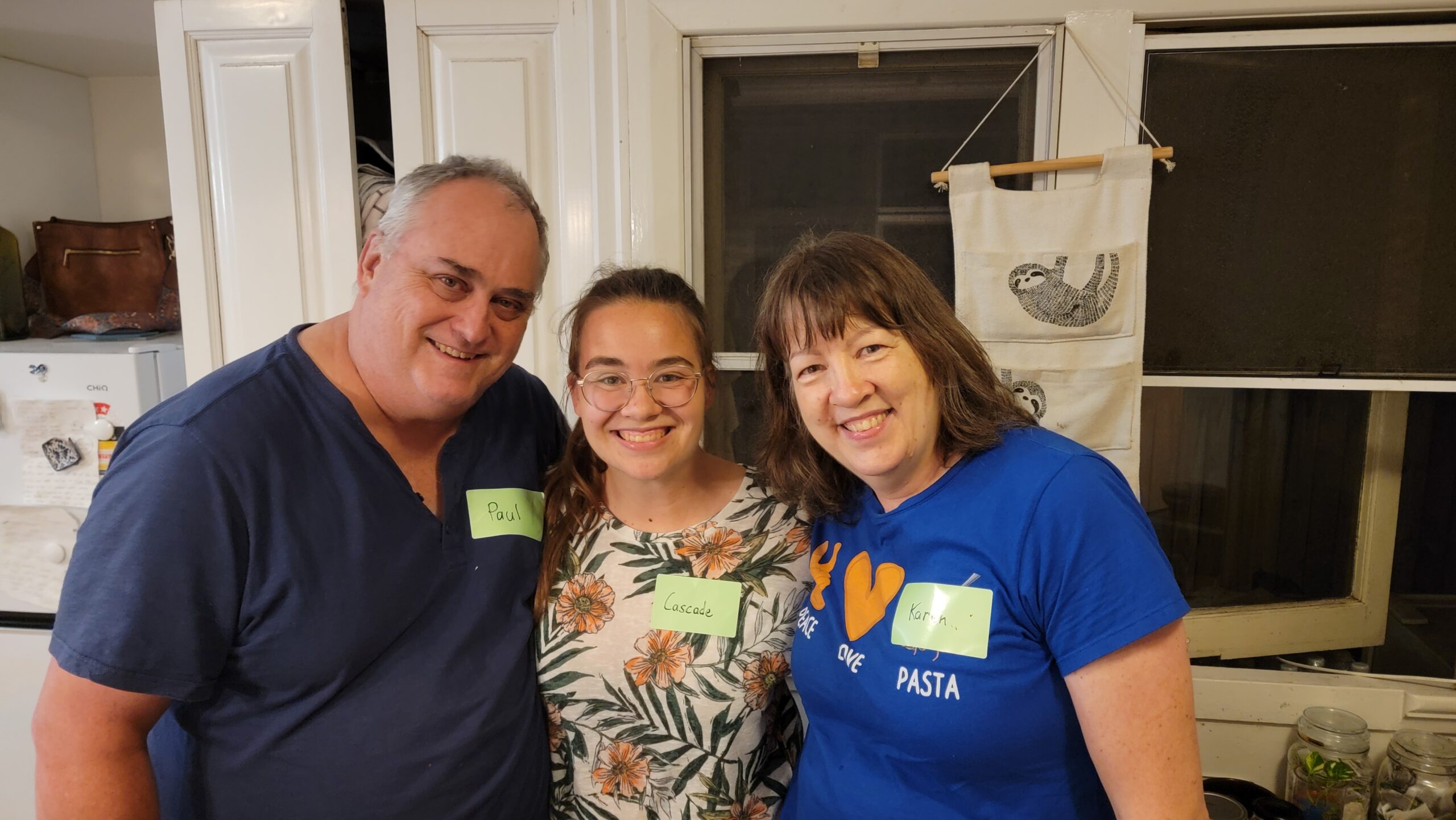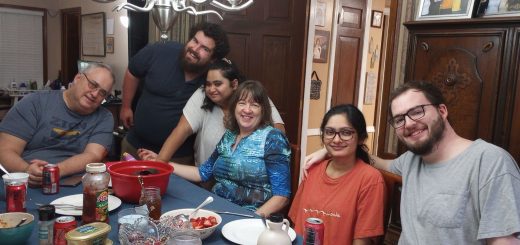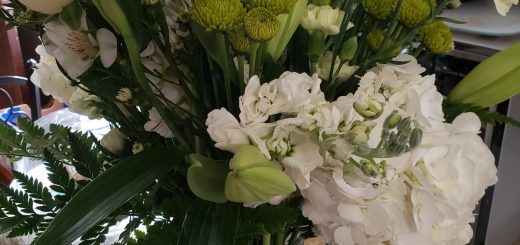Candid in Our Challenges, Secure in Our Savior

“Candid in our challenges, secure in our Savior” – September 15th, 2024 (Psalm 125)
Mother Teresa said, “Life is an opportunity, benefit from it. Life is a beauty, admire it. Life is bliss, taste it. Life is a dream, realize it. Life is a challenge, meet it. Life is a duty, complete it. Life is a game, play it. Life is costly, care for it. Life is wealth, keep it. Life is love, enjoy it. Life is mystery, know it. Life is a promise, fulfill it. Life is a sorrow, overcome it. Life is a song, sing it. Life is a struggle, accept it. Life is a tragedy, confront it. Life is an adventure, dare it. Life is luck, make it. Life is too precious, do not destroy it. Life is Life, fight for it!” I was drawn to this quotation because it paints both an honest and a hopeful picture of what life is like. We’ve all rowed our boats long enough to know that the children’s rhyme is anything but accurate – life is rarely like rowing gently down the stream, merrily, and life is certainly not but a dream! Today we are going to learn to be more candid in our challenges and secure in our Savior. I want to start by sharing three stories with you.
Lacey – denial & isolation
Story number 1: Many years ago, I became friends with Lacey, a vibrant and joyful Christ-follower. Our lives overlapped as we occasionally took our children on field trips together. We hadn’t seen each other in several months, when I was shocked to hear that Lacey had been diagnosed with a life-threatening condition that had a good prognosis as long as immediate interventions were received. To the dismay of many around her, Lacey refused to accept her diagnosis, falling into the trap of erroneously thinking that declaring she was healed was the same thing as actually being healed. The Bible tells us that God will heal and restore all things ultimately, but we are not promised that God will do a particular healing situationally or in the time and manner of our choosing. Although Lacey’s response was dressed up as an act of faith, she was actually playing pretend. Sadly, by refusing to accept the reality of her situation, Lacey chose to live in the prison of denial instead of living in the freedom of truth and life. WebMD says that “if you are in denial, you are trying to protect yourself from a truth that is too painful for you to accept at the moment.” Of course it was painful for Lacey to accept her diagnosis. Nobody wants that kind of bad news for themselves or a loved one. Short-term denial can be a good thing as it gives us room to wrap our minds around a big change and move towards acceptance. But long-term denial can lead to distorted thinking and behaviors, isolation, bullying, or self-harm. In Lacey’s case, her denial lead her to think she knew more than she could possibly know about what God would do in her specific situation. She grew increasingly isolated from other Christ followers and even denied her family the privilege of walking through her pain with her because she refused to acknowledge that any struggle existed. Her choices showed that she was unable to trust in God’s presence and provision for her. Lacey also inadvertently caused much anxiety and insecurity for her family members who frustratedly watched her go to her grave while refusing all help.
Pierre – deception & abuse
Story number 2: A news story broke this week about a Christian leader Pierre who began an amazing anti-poverty charity that has helped countless people for almost 70 years in over 40 countries. Pierre was considered a saint in his lifetime because of his tireless work for the poor and homeless. He was widely adulated wherever he went as an emblem of Christian self-sacrifice. However, many allegations have emerged about his sexually abusive and predatory behavior towards a large number of people over a period of many decades. These allegations have been so numerous that the organization Pierre founded has decided to remove his name, images, and, in fact, any association with him. To make matters even worse, many colleagues were aware of Pierre’s sexual behavior but failed to speak out. One biographer wrote that “there were groupies of every kind who just wanted to pull out a hair of his beard. It was total hero-worship.” The head of the foundation said, “We are in a state of shock, very hurt and very angry … We extend our fullest support to all the victims who have had the courage to speak out.” Sadly, Pierre chose to live in the prison of deception instead of in the freedom of light and life. His deception lead him to commit atrocious acts against others while he and others covered up his abuse for many years.
The Garden – hospitality & openness
Story number 3: On Tuesday Paul and I had the huge privilege of being invited to prepare for and participate in the Tuesday Night Event at The Garden student ministry where Cascade works at the University of Queensland. We joined Cascade and her team in joyfully preparing a delicious meal, attending the pre-event planning meeting, spring cleaning the kitchen, and sprucing up the entire house. The Event itself was an incredible experience for us as 40-50 students from all over Australia and the world gathered for a joyfully shared meal and highly interactive meeting at The Garden. The Garden ministry is a place of radical hospitality and openness that meets students where they are in the challenges of life. Everybody who came on Tuesday night was invited to belong, participate, share, celebrate, grow, and communicate. One phrase we heard over and over was, “The Garden is founded on Christian values and we who lead it are followers of Christ. For that reason, everyone is welcome here, no matter what you believe or don’t believe.” We were so encouraged and inspired by this incredible ministry of hospitality, authenticity, and grace. What a joy to experience God’s love transforming the lives of these young people as they proclaim and demonstrate the good news of Jesus at The Garden!
Psalm 125
We all know, as Mother Teresa said, that life is a challenge. Those three stories each offer a glimpse into how some chose to respond to the challenges they encountered. Each person on the planet has challenges. We are each given the choice not as to whether we have challenges, but how we face those challenges. We could choose denial and isolation, as Lacey did. We could choose deception and abuse, as Pierre and many of his colleagues did. We could choose hospitality and openness, as those at The Garden are doing and are inviting others to do. There are other choices we could make, of course. But today we are hopefully going to move towards God’s highest and best. As we take a good look at Psalm 125 in our continuing journey through the Pilgrimage Psalms, my hope for us today is that we would together become more candid in our challenges and secure in our Savior.
Psalm 125:1-5 (NRSV) –
“1 Those who trust in the Lord are like Mount Zion, which cannot be moved, but abides forever. 2 As the mountains surround Jerusalem, so the Lord surrounds his people, from this time on and forevermore. 3 For the scepter of wickedness shall not rest on the land allotted to the righteous, so that the righteous might not stretch out their hands to do wrong. 4 Do good, O Lord, to those who are good, and to those who are upright in their hearts. 5 But those who turn aside to their own crooked ways the Lord will lead away with evildoers. Peace be upon Israel!”
Psalm 125 gives valuable insight into the faith of God’s people in at the time this was written. We get a glimpse of a community cast down by societal stressors and weighty worries. We hear the hearts of loving leaders longing to lighten the load as they offer both requests to God and reassurances to the people.
We all get cast down by stressors and worries at times. Psalm 125 has long brought the comfort, hope, and perseverance to all who feel anxious or afraid in our uncertain and insecure world. Psalm 125 reminds us that God calls us to be candid in our challenges and secure in our Savior.
Any one of us can and has probably at times faltered in faith in some way. Sometimes God’s people can suffer a communal crisis of confidence. Psalm 125 speaks directly to times like that, when it feels like our whole world is being shaken and turned upside down, like one of those crazy carnival rides where you’re being turned inside a pod that’s swirling around on a wheel going a whole different way.
A couple of weeks ago, my Dad and I were talking about our ocean voyage when we moved from the US to Australia in 1971. Upon disembarking after five weeks at sea, Dad described how difficult it was for all of us to walk on land again. As he talked about that, it reminded me of that sea shanty, “What shall we do with the drunken sailor … early in the morning!” I remember my 7-year-old steps being so uncertain that I was afraid I’d fall off the edge of the gangplank connecting our ship to the wharf. Our whole family faltered in our footsteps at the same time.
How about you? How is it with your soul? Are you tired of the turbulence of the times? Are you chafed by the craziness of the crowd? Are you blindsided by the bizarreness of the banter? Are you sick of the strangeness of the scandals? Are you nauseated by the noxiousness of the news? Psalm 125 reassures us that whether we’re facing personal problems or communal crises, we can be candid in our challenges and secure in our Savior. For the rest of our time together, we are going to look at these two aspects.
Candid in our challenges
For the first aspect, being candid in our challenges, we are going to move beyond just talking about that today; we are also going to do something very practical that I hope will help us.
Here’s the plan. We’re going to listen to Psalm 125 in song. While we listen, we are going to do an exercise to help us to become completely candid with God and appropriately candid with one another. I’m inviting us to write down challenges we’re facing and then later in the service we will together give all these cares and worries to God, for he cares about us (1 Peter 5:7). Try and write things down briefly in such a way that when someone reads them aloud later today, it will be anonymous as to who wrote what. Do not include your name or anyone else’s name. If necessary, the reader will alter what’s written as they read them aloud later on, to provide anonymity for each person. You will receive several slips of paper and a pen. I want to invite you to write down each specific challenge that comes to mind on a separate piece of paper.
Consider whatever challenges you are currently facing that are weighing you down. Think of it as a kind of pulse check to see what is cluttering up our peace and security in our Savior. Although Jesus tells us to abide in him, none of us does that perfectly all of the time. Consider anything that is hindering you from that place of rest. To follow Jesus is to live in the tension between the brokenness of this world and the perfect shalom of the kingdom of God. Our goal in this exercise is to together grow in being candid in our challenges, and this is a concrete way of doing that. We can trust God that by faith, he is going to meet us in each challenge right where we are. [play music]
Towards the end of the sermon, I will ask someone to read these candid challenges aloud, and we will lay them down before the Lord one by one, together asking for God’s help and hope on behalf of each one of us. Someone will collect those slips of paper now, and you are welcome to add others to the bucket at the back of the room between now and the end of this sermon.
That brings us to the second thing we’re going to do today. Psalm 125 points us to the Lord as our reliable and enduring object of trust. And as short as it is, this psalm has three distinct sections, each of which shows us one of the ways in which we are secure in our Savior.
We are secure in our Savior’s presence (v. 1-2).
Psalm 125:1-2 – “1 Those who trust in the Lord are like Mount Zion, which cannot be moved, but abides forever. 2 As the mountains surround Jerusalem, so the Lord surrounds his people, from this time on and forevermore.”
Here we see that those who trust in God are compared to Mount Zion and to Jerusalem. As part of the battle against chaos, when God created the world, he created Mount Zion and Jerusalem as the seat of his rule. Yet it is not in a mountain or a city that we are to place our trust. These objects are pointers for us that direct us to put our trust in the Lord, on whom we can completely rely. Because Jesus is Emmanuel, God with us, we are assured that God is eternally present with us, right here, right now. God’s presence means that even when we feel defenseless, we are always surrounded by God. God’s presence means that we as God’s people will be as steady, unbreakable, and permanent as God’s Kingdom rule and reign. God’s presence means that there is enough justice and joy and guidance and goodness for all.
Psalm 48:1-2 – “1 Great is the Lord and greatly to be praised in the city of our God. His holy mountain, 2 beautiful in elevation, is the joy of all the earth, Mount Zion, in the far north, the city of the great King.”
Another detail from this section is that the very first word in Psalm 125 is not a singular “one” or “the one” but a plural – “those.” “Those who trust in the Lord …” It’s not about individuals each going our own way. It’s about the community of those who trust in the Lord together.
Also notice that the opening words of this Psalm simply say, “those who trust in the Lord” without mentioning any kind of qualification. Theologian Walter Beyerlin notes that Scriptural sages “desire, as succinctly and briefly as possible, to apprehend and speak truth about experiences that are universally valid, not just for particular individuals but for everyone characterized by the attitude and action described by the verb they use.” Psalm 125 doesn’t begin with, “Those who have a special title who trust in the Lord” or “Those who have a regular quiet time who trust in the Lord” or “Those who are always confident in God’s goodness who trust in the Lord.” It simply says, “those who trust in the Lord,” a possibility open to everyone, no matter who they are or what they’ve done.
Notice also that those who trust in the Lord “cannot be moved” but “abides forever” assures us that we are secure in both space and time. We can be confident that God continually nurtures, protects, and encompasses us here and now and everywhere and always. We can together grow in being both candid in our challenges and secure in our Savior’s presence.
We are secure in our Savior’s sovereignty (v. 3).
Psalm 125:3 – “3 For the scepter of wickedness shall not rest on the land allotted to the righteous, so that the righteous might not stretch out their hands to do wrong.”
Here, “the scepter of wickedness” refers to the rule of an earthly system. Both history and daily news clearly show us that earthly kingdoms are temporary and are characterized by dishonesty, partiality, and injustice. We may feel that unjust systems may have the upper hand. But we are told that “the scepter of wickedness shall not rest on the land allotted to the righteous.” The psalmist assures us that the scepter of wickedness will not remain forever. The Lord will always put a limit on what the wicked can do because God is sovereign. God has always been and is and always will be the king of all kings and the lord of all lords. Whatever chaos-creating power or pressure we are threatened by or experience in the present will come to an end. God will never leave God’s people in a predicament in which doing evil is our only option.
Let’s remember that earthly systems are not like our sovereign Savior. God’s kingdom is characterized by equity, fairness, and justice. Psalm 45:6 tells us, “6 Your throne, O God, endures forever and ever. Your royal scepter is a scepter of equity.”
Jesus warned us that we will be tempted to fall away, in Matthew 24:12, “12 And because of the increase of lawlessness, the love of many will grow cold.” We also know that God will give us the grace we need to endure. 1 Corinthians 10:13 – “13 No testing has overtaken you that is not common to everyone. God is faithful, and he will not let you be tested beyond your strength, but with the testing he will also provide the way out so that you may be able to endure it.”
It is precisely because of God’s sovereignty, which endures forever, that we are able to endure. We can together grow in being both candid in our challenges and secure in our Savior’s sovereignty.
We are secure in our Savior’s shalom (v. 4-5).
Psalm 125:4-5 – “4 Do good, O Lord, to those who are good, and to those who are upright in their hearts. 5 But those who turn aside to their own crooked ways the Lord will lead away with evildoers. Peace be upon Israel!”
Here the psalmist asks God for his blessing on behalf of God’s troubled people, to actively intervene for those who are good and upright. The original Hebrew speaks to acting ethically as in Micah 6:8, “He has told you, O mortal, what is good; and what does the Lord require of you but to do justice, and to love kindness, and to walk humbly with your God?”
The psalmist also describes how those who turn aside to their own crooked ways will end up being lead away. This is not so much a prescription of punishment as it is a description of consequences. God has given each of his image bearers the gift of free will, the ability to choose between good and evil. The psalmist is here showing the contrast between what happens when people choose vice over virtue, wrong over right, gain over goodness, apathy over love.
A character in C.S. Lewis’s masterpiece, The Great Divorce, noted, “There are only two kinds of people in the end: those who say to God, ‘Thy will be done,’ and those to whom God says, in the end, ‘Thy will be done.’ All that are in Hell, choose it. Without that self-choice there could be no Hell. No soul that seriously and constantly desires joy will ever miss it. Those who seek find. To those who knock it is opened.”
The psalmist closes with the priestly blessing, “Peace be upon Israel.” The Hebrew word translated “peace” is shalom, which is the way things ought to be. Shalom speaks of universal flourishing, wholeness and delight, the rich state of affairs, as Cornelius Plantinga says “in which natural needs are satisfied and natural gifts fruitfully employed, a state of affairs that inspires joyful wonder as its Creator and Savior opens doors and welcomes the creatures in whom he delights.” We can together grow in being both candid in our challenges and secure in our Savior’s shalom. Because of God’s presence, sovereignty, and shalom, we can live secure in our Savior.
Secure in our Savior
That brings us to the time in our service when we are going to together give our challenges to the Lord. As someone reads out loud each of the challenges we’ve written down, let us cry out to God on behalf of those facing each particular challenge, and ask for God’s help and hope!
[read slips of paper aloud (anonymously)]Father God, Lord Jesus, Holy Spirit, thank you for calling us higher and for helping us to together grow in being both candid in our challenges and secure in our Savior. Thank you, our Lord and Savior Jesus Christ, for your presence, your sovereignty, and your shalom. We again place our hope and our trust in you, today and forever. Amen.




